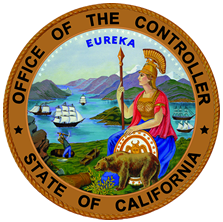State Controller's Office (SCO)
Last updated 12/06/2024

Contact
- Email: eoinquiry@sco.ca.gov
- Phone: 916-445-3028
Description
The Controller is the Chief Fiscal Officer of California, the sixth-largest economy in the world. Elected every four years, the Controller is responsible for accountability and disbursement of the state’s financial resources. The Controller also safeguards many types of property until claimed by the rightful owners, and has independent auditing authority over government agencies that spend state funds. The Controller helps administer two of the nation's largest public pension funds, and serves on 70 state boards and commissions with authority ranging from state public land management to crime victim compensation.
Services
Search for Unclaimed Property
California's Unclaimed Property Law requires corporations, businesses, associations, financial institutions, and insurance companies (referred to as "Holders") to annually report and deliver property to the California State Controller's Office after there has been no activity on the account or contact with the owner for a period of time specified in the law - generally (3) three years or more. This search page will allow you to locate Unclaimed Property that already has been sent to the State for safekeeping, as well as property that is about to be sent to the State by a business as required by law. If you feel you may have other accounts that did not appear in your search, please return to this site at a later date as names are continually added to the Unclaimed Property database.
Last updated 07/29/2021
Unclaimed Property Reporting Resources
Holders of Unclaimed Property include business associations, banking and financial organizations, life insurance corporations, and other entities holding property belonging to another person. By law, holders are required to review their records each year to determine if they hold any property, whether tangible or intangible, that has remained unclaimed for the required dormancy period. Once property has remained unclaimed for the required dormancy period, it becomes reportable.
Last updated 01/13/2022
Frequently Asked Questions
What is Unclaimed Property?
Unclaimed Property is generally defined as any financial asset that has been left inactive by the owner for a period of time specified in the law, generally three (3) years. The California Unclaimed Property Law does NOT include real estate. Unused gift certificates are also generally excluded from unclaimed property and are not sent to the State as unclaimed property. The most common types of Unclaimed Property are:
- Bank accounts and safe deposit box contents
- Stocks, mutual funds, bonds, and dividends
- Uncashed cashier's checks and money orders
- Certificates of deposit
- Matured or terminated insurance policies
- Estates
- Mineral interests and royalty payments
- Trust funds and escrow accounts
Where can I find more FAQs regarding Unclaimed Property?
Visit the Full FAQ
How Do I Keep My Property From Being Turned Over To The State Controller's Office?
There are several steps you can take to prevent your property from being turned over to the State:
- Cash your dividend, interest, or refund checks promptly.
- Keep accurate records of all financial accounts and review them at least once a year.
- Maintain annual activity on accounts.
- Provide your financial institutions with a primary contact, secondary contact, or beneficiary contact name.
- Remain aware of your accounts.
- Respond promptly to notifications from the business or the State Controller's Office that your property may be transferred to the state if you do not contact the business within the stated time period.
How Does The State Get Unclaimed Property?
California's Unclaimed Property Law requires corporations, businesses, associations, financial institutions, and insurance companies (referred to as "Holders") to annually report and deliver property to the State Controller's Office after there has been no activity on the account or contact with the owner for a period of time specified in the law - generally three (3) years. Often, contact is lost when the owner forgets that the account exists, or moves and does not leave a forwarding address, or the forwarding order expires. In some cases, the owner dies and the heirs have no knowledge of the property.
What is Unclaimed Property?
Unclaimed Property is generally defined as any financial asset that has been left inactive by the owner for a period of time specified in the law, generally three (3) years. The California Unclaimed Property Law does NOT include real estate. Unused gift certificates are also generally excluded from unclaimed property and are not sent to the State as unclaimed property. The most common types of Unclaimed Property are:
- Bank accounts and safe deposit box contents
- Stocks, mutual funds, bonds, and dividends
- Uncashed cashier’s checks and money orders
- Certificates of deposit
- Matured or terminated insurance policies
- Estates
- Mineral interests and royalty payments
- Trust funds and escrow accounts
How Does The State Get Unclaimed Property?
California’s Unclaimed Property Law requires corporations, businesses, associations, financial institutions, and insurance companies (referred to as “Holders”) to annually report and deliver property to the State Controller’s Office after there has been no activity on the account or contact with the owner for a period of time specified in the law—generally three (3) years. Often, contact is lost when the owner forgets that the account exists, or moves and does not leave a forwarding address, or the forwarding order expires. In some cases, the owner dies and the heirs have no knowledge of the property.
Why Does California Have An Unclaimed Property Law?
The Unclaimed Property Law was passed to protect consumers. It prevents businesses with unclaimed property from keeping your money and using it as business income. The law provides California citizens a single source, the State Controller’s Office, to check for unclaimed property that may be reported by businesses from around the nation and enables the State to return property, or the net proceeds from any legally required sale of the property, to its rightful owner or their heirs.
